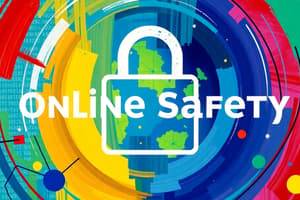Podcast
Questions and Answers
What is the primary purpose of writing clear and concise email subject lines?
What is the primary purpose of writing clear and concise email subject lines?
- To avoid confusion and misunderstandings (correct)
- To comply with company email policies
- To make the email stand out in the recipient's inbox
- To appear more professional
Which of the following is NOT a recommended practice for online privacy protection?
Which of the following is NOT a recommended practice for online privacy protection?
- Enabling robust security measures like firewalls and antivirus software
- Using virtual private networks (VPNs) and encrypted messaging services
- Creating complex passwords and regularly updating them
- Sharing sensitive personal details on social media (correct)
What is the primary goal of cybersecurity measures?
What is the primary goal of cybersecurity measures?
- To ensure compliance with government regulations
- To minimize risk and safeguard critical data (correct)
- To make computer systems completely secure
- To prevent all online attacks and data breaches
Which of the following is NOT a recommended practice for effective email etiquette?
Which of the following is NOT a recommended practice for effective email etiquette?
What is the primary purpose of using a virtual private network (VPN)?
What is the primary purpose of using a virtual private network (VPN)?
Which of the following is a recommended cybersecurity practice for organizations?
Which of the following is a recommended cybersecurity practice for organizations?
Which of the following is NOT a recommended social media guideline?
Which of the following is NOT a recommended social media guideline?
What is the primary role of parents in promoting online safety for children?
What is the primary role of parents in promoting online safety for children?
Which of the following is an example of good email etiquette?
Which of the following is an example of good email etiquette?
What is the primary purpose of enabling two-factor authentication?
What is the primary purpose of enabling two-factor authentication?
Which of the following is NOT a recommended practice for online privacy?
Which of the following is NOT a recommended practice for online privacy?
What is the primary concern associated with cyberbullying?
What is the primary concern associated with cyberbullying?
Study Notes
Online Safety, Security, and Rules of Netiquette
The internet has revolutionized the way we communicate and access information. However, it also poses unique challenges related to safety, security, and etiquette. This article will discuss these concerns within the context of social media guidelines, email etiquette, online privacy, and cybersecurity.
Social Media Guidelines
Social media platforms have become integral parts of our daily lives, offering opportunities for communication, entertainment, and even professional development. However, they also present risks, such as cyberbullying, online harassment, and exposure to potentially harmful content. To mitigate these risks, users should follow best practices like:
- Using strong passwords and enabling two-factor authentication where possible
- Being cautious when sharing personal information, especially with strangers or untrusted sources
- Limiting interactions with those who may pose a threat
- Reporting any abusive behavior or suspicious activity
Additionally, parents play a crucial role in teaching children safe online habits. Regularly reviewing their child's activities, setting appropriate age restrictions, and monitoring screen time can help prevent potential issues.
Email Etiquette
Etiquette is key to maintaining positive relationships both offline and online. In the context of emails, this includes:
- Writing clear, concise subject lines to avoid confusion
- Proofreading messages before sending them, as mistakes can lead to misunderstandings or embarrassment
- Sending attachments only if necessary, and providing alternative formats for compatibility reasons
- Avoiding offensive, discriminatory, or sexually explicit content
- Response times should match expectations; respond promptly if you need more time, ask for a deadline extension or change your availability accordingly
These guidelines help ensure effective communication while avoiding miscommunications or conflicts.
Online Privacy
Privacy is increasingly under threat from data breaches, identity theft, and other forms of digital espionage. Users must take steps to protect themselves by:
- Enabling robust security measures, including firewalls and antivirus software
- Creating complex passwords and regularly updating them
- Adjusting browser settings to restrict tracking, cookies, and data collection
Moreover, individuals should consider using virtual private networks (VPNs) and encrypted messaging services to enhance their privacy. Also, being cautious about what information is shared online, including location tracking and sensitive details, reduces vulnerabilities.
Cybersecurity
Cybersecurity refers to the protection of computer systems against attacks, data breaches, and other malicious activities. It involves staying informed about threats, employing secure practices, and taking proactive measures like:
- Installing anti-malware software
- Updating software frequently to patch known vulnerabilities
- Backing up important files regularly
- Training employees on safe computing behaviors
By following these strategies, organizations can minimize risk and safeguard critical data.
In conclusion, understanding online safety, security, and rules of netiquette is essential in today's interconnected world. By implementing these guidelines into our everyday digital activities, we contribute to creating a safer and more respectful online environment.
Studying That Suits You
Use AI to generate personalized quizzes and flashcards to suit your learning preferences.
Description
Explore key guidelines for staying safe and secure online while maintaining proper netiquette. Learn about social media safety, email etiquette, online privacy protection, and cybersecurity measures to enhance your digital experience.




